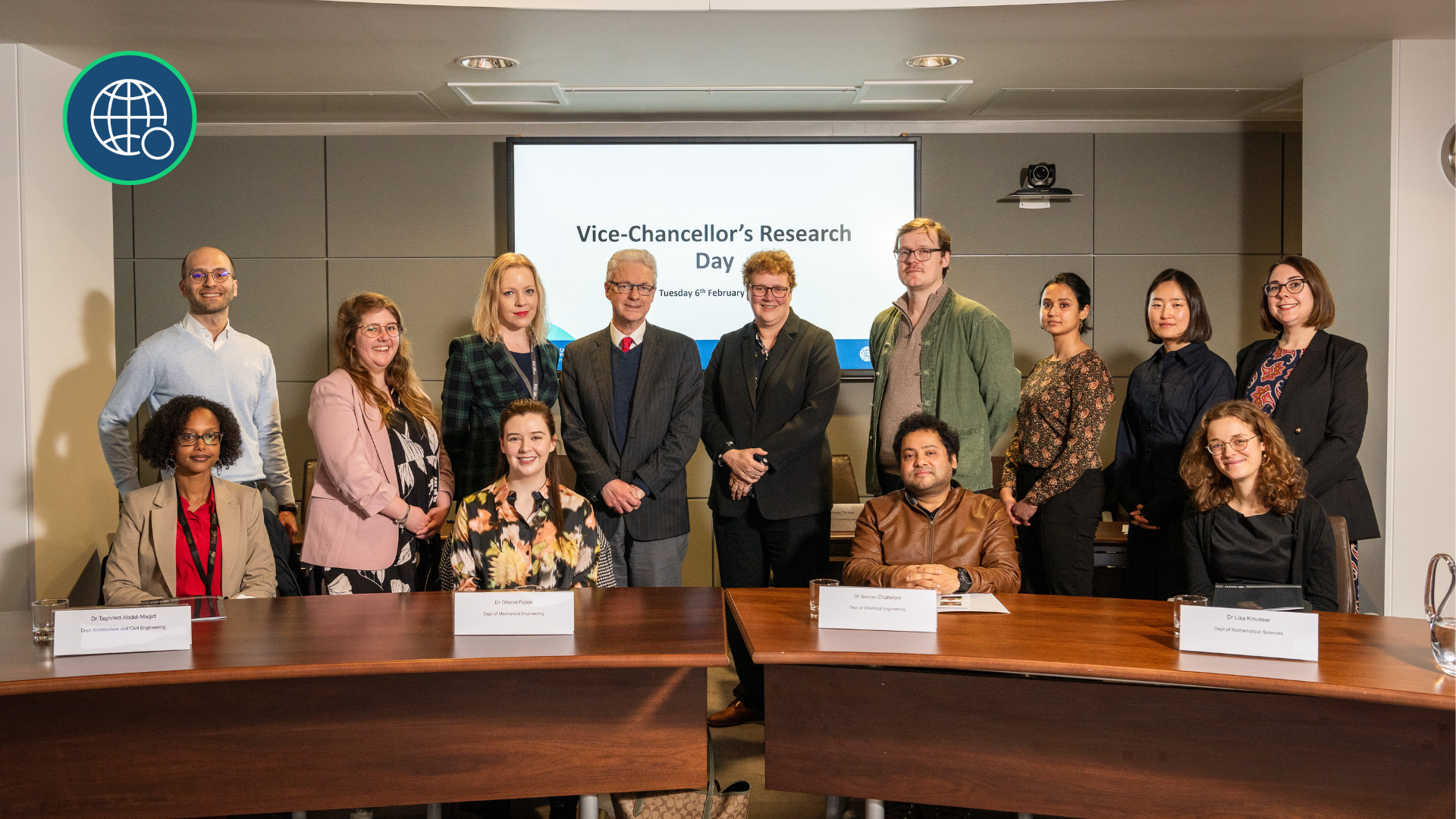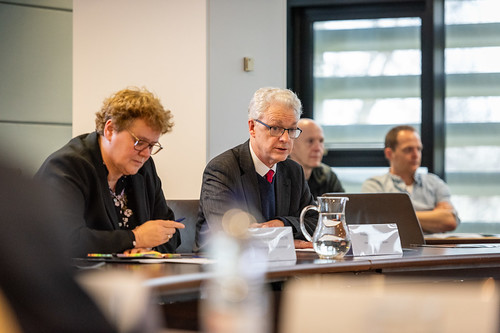On 6 February 2024, Professor Ian White, Vice-Chancellor, hosted the annual Vice-Chancellor’s Research Day on campus.
The session was chaired by Professor Sarah Hainsworth, Pro-Vice-Chancellor (Research & Enterprise), and provided an opportunity for some of our early career academic staff from across the University to showcase their research. Each of the 11 presenters gave a 10-minute presentation, followed by five minutes of questioning.
Professor Ian White, said:
It was a very inspiring afternoon. I was most impressed by the levels of interdisciplinarity and academic rigour displayed by our early career researchers. Driving high-impact research is a key pillar of our University Strategy and it was pleasing to see their desire to create tangible benefits from their research. I would like to offer my gratitude and congratulations to the presenters, and look forward to seeing their work develop.
Professor Sarah Hainsworth, said:
This event always highlights what a great breadth of high-quality research we have at Bath. It was wonderful to showcase and celebrate the work of some of our best early career colleagues and I’m looking forward to following the next steps of their academic careers.
Adverse childhood experiences and cannabis use trajectories
Dr Lindsey Hines is a Lecturer in Health Psychology with a PhD in Epidemiological Psychiatry. Her work explores the causes of drug use and this paper focuses on the relationship between adverse childhood experiences (such as abuse, neglect and violence at home) and patterns of cannabis use in adolescence. Her study uses data from a longitudinal UK birth cohort study of children (and their parents) born in the 1990s, using repeated assessments of family and environmental circumstances in childhood, cannabis use in teenage years and genetic data. The research, published in The Lancet Public Health, identifies children most at risk of regular use of cannabis in teenage years.
Read the presentation and article
Micro date and macro models: understanding pathways to a zero-carbon economy
Dr Ara Jo is a Lecturer in the Dept of Economics. She has a PhD from the London School of Economics and was a postdoctoral researcher at ETH Zurich before joining Bath. Ara's work looks to leverage economic research to tackle climate change through creative use and innovation of technologies. She combines micro data from businesses in France and the UK to investigate the form and stringency of optimal climate policy that will help us meet our goal of achieving carbon neutrality by 2050. And whether strategic behaviour by industrial firms could lead to a reduction in carbon tax in the future.
Theorising 21st-century financialisation: lessons from 20 years of land dispossession in the south
Dr Mihika Chatterjee is a Lecturer in International Development in the Dept of Social and Policy Sciences. Her research looks at the intensification of land commodification in the global south and the implications for food security and sustainability. She explores the impact of the 2008 food crisis, the volatility of the US dollar, rising energy prices and the surge in demand for biofuels (such as soybeans) to address the energy crisis. These factors have led to a high demand for land use and are creating food versus fuel tensions. Using evidence from the ‘periphery’/South, Mihika's research sharpens the analysis of a largely global capital-centric theorisation of financialisation in political economy.
The orbit method in representation theory
Dr Lewis Topley is a Reader in Pure Mathematics. His research focuses on Representation Theory and his presentation focused on the representation theory of Lie algebras − mathematical tools for understanding symmetry. Although representation theory and symmetry have many important applications in physics, Lewis looks at these concepts from a purely mathematical perspective, using new algebraic objects called finite W-algebras to explain the fundamental properties of these representations. Lewis spent seven years solving what was regarded by peers as a wildly challenging problem, relating representations with coadjoint orbits. These results led to a sole-authored paper, published in one of the top maths journals, Inventiones Mathematicae.
Unlocking the potential of data with mathematics
Dr Lisa Kreusser is a lecturer in Applied Mathematics and a Fellow of the Institute of Mathematical Innovation. She was previously a PhD student and Junior Research Fellow at Cambridge. Lisa's research looks at the interface of applied and computational mathematics, data science and machine learning in diverse applications, ranging from biology to climate science.
Application of AI guided automated flow platforms for understanding complex chemical systems
Dr Sourav Chatterjee is a Lecturer in the Dept of Chemical Engineering. He specialises in the design and application of automation, flow chemical systems and machine learning to study complex chemical problems. Over the last three years, he has been developing an automated flow platform to accelerate and simplify the preparation of molecules by removing the physical barriers to organic synthesis. The aim is to ultimately understand reaction mechanisms, control chemical synthesis and synthesize better Active Pharmaceutical Ingredients (APIs).
Characterising engineering materials under extreme dynamic load conditions
Dr Chanel Fallon is a Lecturer in the Dept of Mechanical Engineering. Her research focuses on the study of materials and structures under extreme dynamic loading conditions, from high-speed impact to explosive blast events. Her unique experiments reveal insights into material behaviour under extreme loads and temperatures, to gain better understanding for safety-critical design. Chanel shared findings from her work on civilian infrastructure (protecting concrete from fragmentation using elastomer coating) and aerospace materials (experimenting with a cryogenically-cooled gas gun).
Regeneration, transformation, collaboration...and other 'tion' words
Civil Engineer Dr Taghreid Abdel-Magid is a Lecturer in the Dept of Architecture and Civil Engineering and holds a PhD in sustainable construction materials. Her work focuses on regenerative design in construction. Regenerative design looks at how buildings can be designed to minimise their environmental impact and contribute positively to local ecosystems using natural or synthetic building materials. While established in agriculture, chemistry and health sciences, it is a relatively new concept in construction. Taghried is currently involved in numerous multidisciplinary projects across the University to help tackle the challenge of getting society to adopt natural sustainable and regenerative materials.
How moralised groups can help promote societal transformation
Dr Annayah Prosser is an Assistant Professor in Marketing, Business and Society at the School of Management. Her work explores the challenges in change and works to understand how moralised groups (such as zero wasters, vegans, Fridays for Future) can help us understand societal change. Society faces many ‘grand challenges’ such as climate change that can only be addressed through collective behaviour change. Morally motivated individuals make significant sacrifices to make their behaviour more pro-environmental. Annayah looks at how these early adopters can help inspire transformations in wider society, and the barriers they face in doing so.
What to expect from drones in operations management
Dr Omid Maghazei is a Lecturer at the School of Management. As part of his Doctoral degree at ETH, Zurich, he studied drones in operational settings such as IKEA. Drones offer huge potential to improve how we deliver goods, inspect equipment and take images and videos from infrastructure. But their adoption in operational setting poses distinct challenges, particularly in indoor environments. Omid's research focuses on the what, why and how of adopting, implementing and integrating drones in operations management and has been published in the Journal of Operations Management.
Changing households: social, psychological and economic consequences of wives out-earning their husbands
Dr Joanna Syrda is a Lecturer in Business Economics at the School of Management, Marketing, Business and Society Division. Her research looks at how improvements in the women's labour market outcomes and the increased likelihood that women can out-earn their male partners may impact their spouses, children, and peers. Her work examines the relationship between spousal relative income and household production and consumption decisions. It finds a challenge to traditional gender identity norms in the form of women out-earning their spouses is associated with various consequences, such as his higher psychological distress or her higher housework provision to compensate for this non-traditional outcome.


